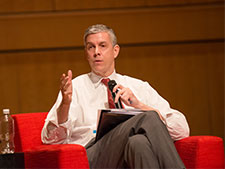From K-12 to P-16
U.S. Secretary of Education Arne Duncan discusses strengthening American education through partnerships, from preschool through college.
UMBCs national leadership in innovative teaching and K-12 partnerships made the university a fitting choice to host A Conversation with Arne Duncan, on February 18. The talk by U.S. Secretary of Education Duncan focused on opportunities to continue strengthening education across the continuum, from early childhood through college.
Secretary Duncan spoke to an audience of UMBC students, faculty, and staff, along with educators and other members of the public that filled the Performing Arts and Humanities Building Concert Hall. The nations top education official discussed the significant progress made by U.S. schools, and the collaborative and innovative work that has helped Maryland become a national leader in preparing students for college and careers.
Teachers, principals, community leaders, families and the students themselves have helped to bring about some of the biggest and boldest changes in American education in decades to prepare all of our children for college, careers, and life, Sec. Duncan said during his remarks. These changes include higher standards, better support for teachers, a powerful focus on improvement in instruction, and underlying all of that, a fundamental conviction that great schools, principals, and teachers can and do transform the lives of our children.
Duncan highlighted UMBCs strength in preparing the next generation of teachers and affirmed the Choice Programs pledge to empower at-risk youth and families.
Following his remarks, Duncan participated in a wide-ranging discussion with UMBC President Freeman Hrabowski on topics such as improving literacy rates among low-income children, reinvesting in supporting women in technology, and what universities can do to be better partners of K-12 education.
During the discussion, Sec. Duncan praised UMBC for investing in course redesign and innovative teaching, and for the universitys commitment to changing the broader culture of education. Youre not just talking about this, youre living it. Youre walking the walk, Duncan said.
The focus of Secretary Duncans talk supporting students educational progress through partnerships is core to what makes UMBC programs for aspiring and professional teachers so exceptional.
We have worked with our partners from pre-K through high school from four surrounding school systems to develop unique programs in biology, chemistry and physics, as well as state- and nationally -recognized programs in the arts, humanities, elementary and early childhood education, shares Eugene Schaffer, professor and chair of education.
UMBC serves as a pipeline for K-12 teachers at a critical time for schools across the nation. Undergraduates aspiring to teaching careers also have a wealth of training and support opportunities, including the Sherman STEM Teacher Scholars Program and the TEACH (Federal Teacher Education Assistant for College and Higher Education) Grant Program.
The Sherman STEM Teacher Scholars Program is a selective scholarship program that identifies and nurtures students seeking to become math and science teachers serving high-need communities. The Sherman program teaches UMBC students to be empathetic to the complexity of students situations, while still serving as teachers who help them grow academically, says Rehana Shafi, director of the Sherman program.
About 75 percent of the Sherman programs graduates go on to teach students in communities that are financially challenged. Shafi adds that K-12 schools say one of the extra benefits of the program is the opportunity for UMBC students to talk with their students about how college is important and attainable. They demystify college and share what students need to do to prepare for it.
The TEACH Grant Program provides grants of up to $4,000 a year to students who are completing or plan to complete course work needed to begin a career in teaching. Students commit to teaching in a high-need field at an elementary school, secondary school or educational service agency that serves students from low-income families for at least four full academic years within eight years after completing (or ceasing enrollment in) their course of study.
Teacher training in collaboration with K-12 schools, and educational partnerships more broadly, are an important part of UMBCs mission. Drawing on strong examples of successful, inspiring partnerships, Duncan emphasized that the United States needs to move from thinking about K-12 and college separately to thinking about the P-16 continuum.
Today, school should mean preschool through a postsecondary degree. What worked for the past 100 years I think is insufficient as we move forward, Duncan said. Whats really striking is that in places that have shown the most courage and commitment to these changes, those places have seen the most progress.
(02/20/2015)
© University of Maryland, Baltimore County 1000 Hilltop Circle, Baltimore, MD 21250 410-455-1000

